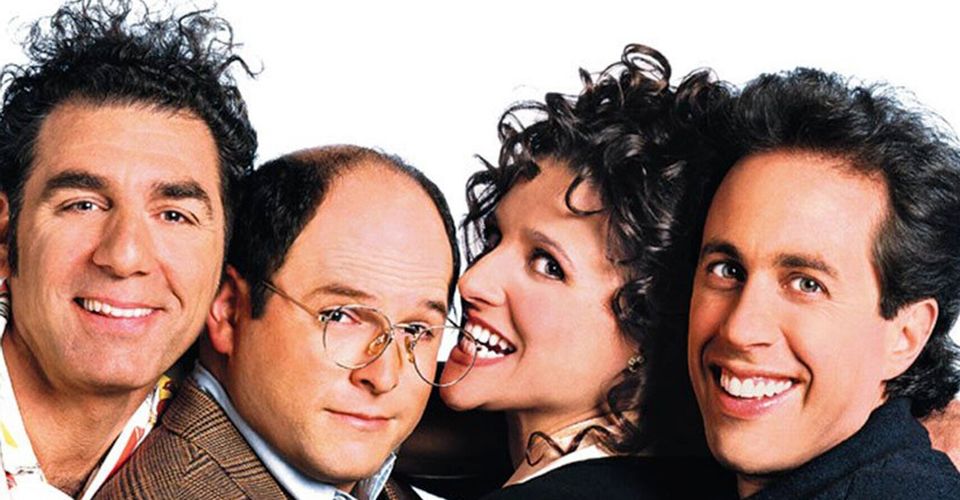Seinfeld: 5 Ways The Show Got Better After Larry David Left (& 5 Ways It Got Worse)

Seinfeld has left a legacy that almost every other television show only dreams of. Over 20+ years after its debut, Seinfeld has maintained a cultural presence through its many catchphrases, eccentric side-characters, and sardonic wit. A lot of the show’s trademarks were the brainchild of writer/creator Larry David. David, who wrote many of the most notable episodes of the show such as “The Contest” and “The Parking Garage“, was a key force in the series’ creative direction for a majority of its run.
After David left the show at the end of the seventh season, Seinfeld carried on without him — for better or for worse. Here are 5 ways the show got better after Larry David left, alongside 5 ways it got demonstrably worse.
10 Worse: The Opening

Starting with the eighth season premiere, “The Foundation,” Seinfeld did away with the excerpts of Jerry Seinfeld performing stand-up comedy at the beginning and the ending of the show. No doubt a strange choice, the omission of the routine clips was a first indication to audiences that the format was shifting following Larry David’s departure.
Jerry’s stand-up career had always been a large part of the show, and even when stand-up didn’t play a direct role in the plot, it was always fun to see the way the episode’s events tied into the bookended segments in the comedy club. “If it ain’t broke …”
9 Better: The Experiments

The modus-operandi of the series had always focused on the comedy of the banal, the details that made the lives of the characters so much fun to watch. However, as Jerry Seinfeld assumed the showrunner position vacated by Larry David, the show began to make some forays into experimental waters.
Consider episodes such as “The Merv Griffith Show” or “The Van Buren Boys” when thinking about how the show began committing to a more absurdist style of comedy. In a lot of ways, these new experiments helped keep the show fresh and alive in the final two years of its initial run.
8 Worse: The Observation

It’s undeniable that Larry David’s keen eye for the “mundane” was missing in the latter two seasons. Under his creative direction, Seinfeld thrived by putting a magnifying glass to the little social discrepancies that define our modern world.
Many of the episodes he penned, either with Jerry Seinfeld or on his own, contain iconic perspectives on topics relatable to almost anyone watching. Consequently, it’s hard to imagine there being episodes like “The Chinese Restaurant” or “The Big Salad” in the seasons without him.
7 Better: The Softened Edges

After the polarizing reception of “The Invitations“, the writers decided to focus less on the more narcissistic traits of the four leads. George’s indifference to his fiancé’s death at the end of the episode left a sour taste in the mouths of many viewers. As a result, George became less of a conniving misanthrope, inspiring far more pity than disdain.
In doing this, the writers ensured the audience could still enjoy the quartet’s misadventures without having to confront such dark moral dilemmas as presented in the season seven finale, penned exclusively by Larry David.
6 Worse: The Gimmicks

While the experimentation was to be commended, there were numerous cases in which the new absurdist bent gave way to novelty. Without a doubt, the most notable example of the turn towards gimmickry comes with “The Betrayal“, an episode that plays out entirely backward.
In the earlier seasons, the show never played with its format in such a dramatic fashion, choosing to stay grounded in a very linear approach. While the episode is still watchable, it is hard not to find the whole thing out of tune with the rest of the series. It’s a jarring and strange detour that one can’t imagine Larry David taking at the helm.
5 Better: The Puddy

Patrick Warburton made his debut as lovable dimwit David Puddy in season six. The character appeared in 10 episodes of the show, eight of them in season nine. Out of all the various love interests introduced throughout the show, Puddy stood out for his ice-and-fire chemistry with Elaine and his deadpan delivery.
There are many instances of Puddy stealing the scene, but “The Burning” truly belongs to him. A late series episode, it managed to recapture the feel of the earlier seasons, largely thanks to Puddy and Elaine’s disagreements over faith.
4 Worse: The “Iconic Moments” Thing

Few shows in their run see the cultural impact that Seinfeld saw. The series was able to churn out instantly iconic moments on an episode-by-episode basis. So when David left, pressure mounted on the show to keep the quality up. As such, the episodes begin to take a more broad approach to their narratives, attempting to keep the series a source of essential TV.
Because of this, the show tends to become transparent in weaker later season episodes, trying to consciously create “iconic moments”. Example episodes like “The Little Jerry” aim too broad in their writing, leaving the experience a little flat.
3 Better: The Iconic Moments

Though it may have broadened its strokes in attempting to stay fresh and relevant, Seinfeld is still Seinfeld. Even with a shortage of Larry David’s solipsistic genius, the show’s eighth and ninth seasons still managed to produce those classic moments that define the show’s legacy. “The Chicken Roaster” remains a favorite of many, as well as other series landmarks like “The Little Kicks” and “The English Patient“.
Additionally, these episodes contain risky ideas that strayed from the Seinfeld norm, without betraying the show’s signature style and wit, creating a perfect blend of old and new.
2 Worse: The Missing Bite

Larry David’s writing has always contained an element of “bite”, embracing both the sarcastic and the brutally honest. In some of his most acclaimed episodes, David allowed the characters to veer into territories of ethical questionability without sacrificing a laugh.
While the final episodes remain funny, and ahead above their contemporaries, they simply do not have that Larry David signature on them. As a consequence, some of the lesser episodes from seasons eight and nine can fade from memory, relegated to being just another episode of Seinfeld.
1 Better: The Homestretch

Unlike other long-running series at the time, Seinfeld decided to go out on its own terms. At the end of the day, even after Larry David left, the world still got two more seasons of Seinfeld. Without David, Seinfeld was allowed to work out all of the remaining ideas he had for the show.
Larry David returned to write “The Finale” and bring the juggernaut series to a (somewhat controversial) conclusion. Still, the series remains untainted in overall quality. Even better, no sharks were jumped in the process.
About The Author

















